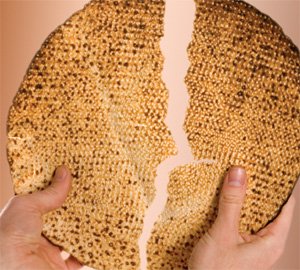|
When we begin reciting the Hagaddah, we uncover the matzot on the seder plate and recite: "This is the bread of affliction that our ancestors ate in the land of Egypt." We don't say, "this is similar to the bread," but "this is the bread." Our purpose is to sense that we ourselves are leaving Egypt, not merely commemorating an event in ancient history. As our sages direct us: "In every generation, we must see ourselves as if we actually left Egypt." (Pesachim 117:2)
"Leaving Egypt" means to elevate ourselves above the bounds of ego and selfishness. Therefore, the first act of the seder is to invite hungry and needy people to join our feast - "May every hungry person come and eat; may every needy person come and make Pesach." This gives us a tangible way to "leave Egypt," through reaching out to others.
Throughout the seder, we use the matza as a symbol of liberation and freedom. The matzah, unleavened bread, is a symbol of meekness and humility - traits that are necessary to acquire in order to leave our
personal "Egypt."
The conclusion of the first passage of the Hagaddah is: "This year we are here; next year we will be in Israel. This year we are slaves; next year we will be free." In spiritual terms, this means: Very soon the redemption will come and we will all be in Israel, where G-d's presence will be revealed and we will all be nullified before Him.
(Based on an address of the Lubavitcher Rebbe, Likutei Sichos vol. 7, p. 262)
|

